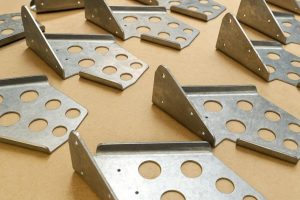
The Vital Role of Sheet Metal Fabrication in Modern Industries
Release time:2025-06-19 Click:137Sheet metal fabrication has been a cornerstone of manufacturing for centuries, evolving from simple hand tools to sophisticated computerized machinery. Today, it stands at the forefront of industrial production, enabling the creation of products integral to our daily lives and technological advancements. From the cars we drive to the planes that fly overhead, from the buildings we inhabit to the medical devices that save lives, sheet metal fabrication is ubiquitous. Its ability to produce durable, precise, and customized components makes it indispensable across numerous industries. This article explores what sheet metal fabrication is, how sheet metal stamping works, and, most crucially, which industries benefit the most from this versatile manufacturing method. By understanding these aspects, businesses can make informed decisions about their manufacturing needs, ensuring they leverage the best possible solutions for their products.
Sheet metal fabrication is the process of cutting, bending, and assembling sheet metal to create various products. It involves transforming flat sheets of metal—typically less than 1/4 inch thick—into functional components through techniques such as cutting (using lasers, plasma cutters, or water jets), forming (bending, rolling, or stamping), and joining (welding, riveting, or fastening). This method is crucial because it allows for the production of complex shapes with high precision, making it ideal for applications where strength, durability, and weight are critical factors. Moreover, sheet metal fabrication is cost-effective, especially for large production volumes, and supports rapid prototyping, which is essential in today’s fast-paced market. Its versatility and efficiency make it a preferred choice across industries like automotive, aerospace, electronics, construction, medical, and appliances.
Sheet metal stamping is a specific subset of fabrication that uses a stamping press to shape metal sheets. The process involves placing a flat sheet of metal, either in blank or coil form, into a press where a tool and die shape it into the desired form. Stamping includes operations such as punching, blanking, embossing, bending, flanging, and coining. This method is highly efficient for producing large quantities of identical parts quickly and cost-effectively. Applications of sheet metal stamping are vast, ranging from automotive body panels and chassis components to household appliance casings and electronic device enclosures. The precision and repeatability of stamping make it a preferred choice for industries requiring high-volume production with consistent quality. For example, in the automotive industry, stamping creates car hoods, fenders, and side panels, while in electronics, it produces enclosures and brackets.

The automotive industry is one of the primary beneficiaries of sheet metal fabrication. Sheet metal is used extensively in the production of vehicle bodies, including components such as the hood, fender, side panels, and roof. These parts are typically formed from large sheets of metal through processes like stamping and bending, which allow for the creation of complex shapes with high precision. Additionally, roll forming and CNC tube bending are utilized to manufacture frames and exhaust systems, ensuring vehicles are both structurally sound and aesthetically pleasing. The ability to produce lightweight yet durable components is particularly important in the automotive sector, as it directly impacts fuel efficiency and overall performance. With the growing demand for electric and hybrid vehicles, sheet metal fabrication continues to evolve, adapting to new design requirements and material specifications, such as high-strength steel and aluminum alloys, to enhance safety and reduce weight without compromising structural integrity.
In the aerospace industry, sheet metal fabrication is indispensable for creating components that must withstand extreme conditions while maintaining optimal performance. Lightweight materials such as aluminum, steel, titanium, and tungsten are commonly used to fabricate parts like airfoils, fuselage sections, and interior components. The precision required in aerospace manufacturing is achieved through advanced fabrication techniques, ensuring each component meets stringent quality standards. Sheet metal’s high strength-to-weight ratio is crucial for improving fuel efficiency and payload capacity, making it a preferred choice for aircraft manufacturers. As the industry pushes for more fuel-efficient and environmentally friendly aircraft, sheet metal fabrication remains central, supporting innovations in design and material science. For example, the Boeing 787 Dreamliner uses sheet metal alongside composite materials, highlighting the continued importance of traditional fabrication methods in modern aerospace engineering.
The electronics industry relies heavily on sheet metal fabrication for producing enclosures, heat sinks, brackets, and other structural components. These parts need to be lightweight, durable, and capable of protecting sensitive electronic circuitry from electromagnetic interference (EMI) and physical damage. Sheet metal, particularly aluminum and steel, provides excellent EMI shielding properties, which are crucial for maintaining signal integrity in devices like smartphones, computers, and telecommunications equipment. Additionally, sheet metal’s thermal conductivity makes it ideal for heat sinks, which are critical for dissipating heat from electronic components and preventing overheating. The precision and customization capabilities of sheet metal fabrication allow manufacturers to produce tailored enclosures that not only protect the internals but also contribute to the product’s overall design and functionality. For instance, companies like Apple use sheet metal enclosures in their devices to balance aesthetics with durability and functionality.

Sheet metal plays a pivotal role in modern construction, offering a range of benefits that make it a popular choice for various applications. Metal roofing, corrugated siding, and sheet metal 2x4s are commonly used due to their durability, fire resistance, and heat reflectivity. These properties make sheet metal an excellent material for both residential and commercial buildings, providing long-lasting protection against the elements. Furthermore, sheet metal’s versatility allows architects and builders to create innovative designs, from curved facades to intricate structural elements. As sustainable building practices gain traction, sheet metal’s recyclability and energy efficiency further enhance its appeal, making it a key component in green construction projects. For example, metal roofing can last 40 years or more, significantly longer than traditional materials like asphalt shingles, reducing maintenance costs and environmental impact.
The medical industry depends heavily on sheet metal fabrication for producing high-precision instruments and devices critical for patient care. Surgical tools, such as scalpels and forceps, are crafted from stainless steel or other alloys that can be easily sterilized and are resistant to corrosion. Sheet metal is also used in the construction of medical imaging equipment, like MRI machines, where materials must be non-magnetic and capable of withstanding repeated sterilization cycles, as noted in Protolabs Network. The precision required in medical manufacturing is well-served by sheet metal fabrication techniques, which can produce components with tight tolerances and complex geometries. As medical technology advances, the demand for custom-fabricated sheet metal parts continues to grow, supporting the development of new devices and treatments. For instance, titanium is widely used in dental implants due to its biocompatibility and strength, while stainless steel is a staple in surgical instruments for its durability and ease of sterilization.
In the appliance industry, sheet metal fabrication is used to create both functional and aesthetic components. Enclosures for appliances, such as refrigerators, washing machines, and ovens, are often made from stainless steel, aluminum, or powder-coated steel, providing a durable and attractive finish. Internal parts, like dryer drums and heat exchangers, are also fabricated from sheet metal, chosen for their heat resistance and structural integrity. The ability to form sheet metal into complex shapes allows manufacturers to design appliances that are not only efficient but also visually appealing. As consumers demand more energy-efficient and smart appliances, sheet metal fabrication continues to adapt, incorporating new materials and designs to meet these evolving needs. For example, copper is used in heat exchangers for its excellent thermal conductivity, while stainless steel enclosures are favored for their corrosion resistance and sleek appearance.
Sheet metal fabrication utilizes a variety of metals, each chosen for their specific properties that make them suitable for different applications. Common materials include:
Steel: Known for its strength and durability, steel is widely used in automotive, construction, and appliance industries. It can be further categorized into carbon steel, stainless steel, and alloy steel, each with its own set of advantages.
Aluminum: Lightweight and corrosion-resistant, aluminum is popular in aerospace, automotive, and electronics for its high strength-to-weight ratio and thermal conductivity.
Copper: Excellent for its electrical and thermal conductivity, copper is used in electrical components and heat exchangers.
Brass: A copper-zinc alloy, brass is valued for its corrosion resistance and aesthetic appeal, often used in decorative and plumbing applications.
Titanium: Extremely strong and lightweight, titanium is used in aerospace and medical industries for its biocompatibility and high melting point.
Galvanized Steel: Steel coated with zinc to prevent rusting, commonly used in construction and outdoor applications.
The choice of material depends on the intended use of the fabricated part, considering factors such as strength, weight, corrosion resistance, and cost.
As technology advances, sheet metal fabrication is poised to evolve with new innovations. Automation and robotics are increasingly being integrated into fabrication processes, improving efficiency and reducing labor costs. 3D printing, or additive manufacturing, is also beginning to intersect with traditional sheet metal fabrication, offering new possibilities for complex designs and rapid prototyping. Additionally, there is a growing focus on sustainable practices, with manufacturers exploring recyclable materials and energy-efficient processes. These trends indicate that sheet metal fabrication will continue to be a vital part of manufacturing, adapting to meet the challenges and opportunities of the future. For example, the integration of AI and machine learning could further optimize design and production processes, making sheet metal fabrication even more precise and efficient.
Sheet metal fabrication offers several distinct advantages over other manufacturing methods. Firstly, it is highly cost-effective, especially for large production runs, due to the efficiency of processes like stamping and the minimal waste generated. Secondly, it provides unparalleled versatility, allowing for the creation of a wide range of shapes and sizes from various materials. Thirdly, sheet metal products are generally more durable and long-lasting than those made from plastics or composites, making them ideal for applications where longevity is crucial. Additionally, the precision achievable with modern fabrication techniques ensures that components meet strict quality standards, reducing the need for secondary operations and minimizing errors. Finally, sheet metal fabrication supports rapid prototyping and quick turnaround times, which are essential in industries where time-to-market is a competitive advantage.
Sheet metal fabrication is a versatile and essential process that underpins many modern industries. From the cars we drive to the planes that fly overhead, from the buildings we inhabit to the medical devices that save lives, sheet metal fabrication is everywhere. Its ability to produce durable, precise, and customized components makes it indispensable in sectors ranging from automotive and aerospace to electronics and construction. By understanding the benefits and applications of sheet metal fabrication, businesses can make informed decisions about their manufacturing needs, ensuring they leverage the best possible solutions for their products. As technology continues to advance, sheet metal fabrication will undoubtedly play an even more significant role in shaping the future of manufacturing.
As a leading machining service provider based in Mexico, Mexmach specializes in sheet metal fabrication, offering a wide range of services from prototyping to large-scale production. Our strategic location allows us to leverage Mexico’s skilled workforce and cost-effective manufacturing environment, providing our clients with high-quality products at competitive prices. Our state-of-the-art facilities are equipped with the latest technology, including CNC machining, laser cutting, and welding capabilities, ensuring we can handle projects of any size and complexity. Whether you need custom components for automotive, aerospace, electronics, or any other industry, our team of experienced engineers and technicians is dedicated to delivering precise, durable, and cost-effective solutions tailored to your specific requirements. With a commitment to excellence and customer satisfaction, [Company Name] is your trusted partner for all your sheet metal fabrication needs. Contact us today to learn how we can bring your designs to life.